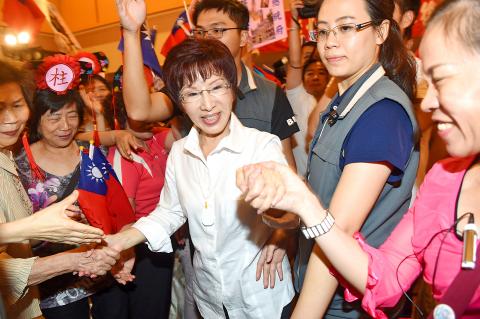Chinese Nationalist Party (KMT) Central Standing Committee member Chiang Shuo-ping (江碩平) yesterday demanded a provisional party congress be held to review whether the party’s presidential candidate, Hung Shiu-chu (洪秀柱), should be replaced, dealing a severe blow to Hung’s campaign and further fueling rumors of division within the party over Hung’s candidacy.
KMT sources were yesterday cited by a TVBS report as saying that the most recent poll conducted by the KMT indicated that Democratic Progressive Party presidential candidate Tsai Ing-wen’s (蔡英文) approval rating had soared to a record level of 45 percent, while Hung’s rating had plummeted to 13 percent.
Anonymous party members said Hung’s support rating was critically low and might severely damage the KMT’s standing in next year’s legislative elections.

Photo: Chien Jung-fong, Taipei Times
Chiang yesterday said he planned to propose that the party hold a provisional party congress at a Central Standing Committee meeting on Wednesday.
KMT sources added that “more than half” of the Central Standing Committee members supported convening a provisional party congress to address the issue of Hung’s candidacy.
In response to media queries on the possibility of party members proposing a withdrawal of Hung’s candidacy, KMT Chairman Eric Chu (朱立倫) earlier yesterday said KMT members are free to “communicate” their opinions via all available channels, adding that party solidarity would be preserved as long as “all come to an agreement.”
In related news, a high-level unnamed KMT source was quoted by the Chinese-language United Daily News as saying yesterday that Hung should not advocate “ultimate unification with China,” because it is not supported by mainstream Taiwanese public opinion.
In a radio interview on Friday Hung said the Republic of China Constitution “calls for ultimate unification with China.”
She said that President Ma Ying-jeou’s (馬英九) stances on the so-called “1992 consensus,” the maintenance of the “status quo,” and “one China, different interpretations,” and “no unification, no independence and no use of force” have “accomplished their medium-term goals,” and that there should now be “political dialogue with China” concerning unification.
Hung had previously advocated the idea of “one China, same interpretation,” only to see her approval rating tank, compelling Hung to “return” to Ma’s standpoints, the source was quoted as saying in the report, who added that Hung “should remember this lesson.”
The “1992 consensus” refers to a supposed tacit understanding between the KMT and Beijing that both sides agree there is “one China,” with each side having its own interpretation of what “China” means.
Hung “is a KMT candidate” who should “ground [her] cross-strait narrative on KMT policies,” or risk the “profound disappointment” of Ma and the party, the source was quoted by the United Daily News as saying.
Hung should “take the initiative” and demand that Tsai, who has said maintaining the “status quo” is the DPP’s policy, clarify how she would define “status quo” and how it would be maintained, the source said.
Additional reporting by Lee Ya-wen

CHAOS: Iranians took to the streets playing celebratory music after reports of Khamenei’s death on Saturday, while mourners also gathered in Tehran yesterday Iranian Supreme Leader Ayatollah Ali Khamenei was killed in a major attack on Iran launched by Israel and the US, throwing the future of the Islamic republic into doubt and raising the risk of regional instability. Iranian state television and the state-run IRNA news agency announced the 86-year-old’s death early yesterday. US President Donald Trump said it gave Iranians their “greatest chance” to “take back” their country. The announcements came after a joint US and Israeli aerial bombardment that targeted Iranian military and governmental sites. Trump said the “heavy and pinpoint bombing” would continue through the week or as long

TRUST: The KMT said it respected the US’ timing and considerations, and hoped it would continue to honor its commitments to helping Taiwan bolster its defenses and deterrence US President Donald Trump is delaying a multibillion-dollar arms sale to Taiwan to ensure his visit to Beijing is successful, a New York Times report said. The weapons sales package has stalled in the US Department of State, the report said, citing US officials it did not identify. The White House has told agencies not to push forward ahead of Trump’s meeting with Chinese President Xi Jinping (習近平), it said. The two last month held a phone call to discuss trade and geopolitical flashpoints ahead of the summit. Xi raised the Taiwan issue and urged the US to handle arms sales to

BIG SPENDERS: Foreign investors bought the most Taiwan equities since 2005, signaling confidence that an AI boom would continue to benefit chipmakers Taiwan Semiconductor Manufacturing Co’s (TSMC, 台積電) market capitalization swelled to US$2 trillion for the first time following a 4.25 percent rally in its American depositary receipts (ADR) overnight, putting the world’s biggest contract chipmaker sixth on the list of the world’s biggest companies by market capitalization, just behind Amazon.com Inc. The site CompaniesMarketcap.com ranked TSMC ahead of Saudi Aramco and Meta Platforms Inc. The Taiwanese company’s ADRs on Tuesday surged to US$385.75 on the New York Stock Exchange, as strong demand for artificial intelligence (AI) applications led to chip supply constraints and boost revenue growth to record-breaking levels. Each TSMC ADR represents

State-run CPC Corp, Taiwan (CPC, 台灣中油) yesterday said that it had confirmed on Saturday night with its liquefied natural gas (LNG) and crude oil suppliers that shipments are proceeding as scheduled and that domestic supplies remain unaffected. The CPC yesterday announced the gasoline and diesel prices will rise by NT$0.2 and NT$0.4 per liter, respectively, starting Monday, citing Middle East tensions and blizzards in the eastern United States. CPC also iterated it has been reducing the proportion of crude oil imports from the Middle East and diversifying its supply sources in the past few years in response to geopolitical risks, expanding